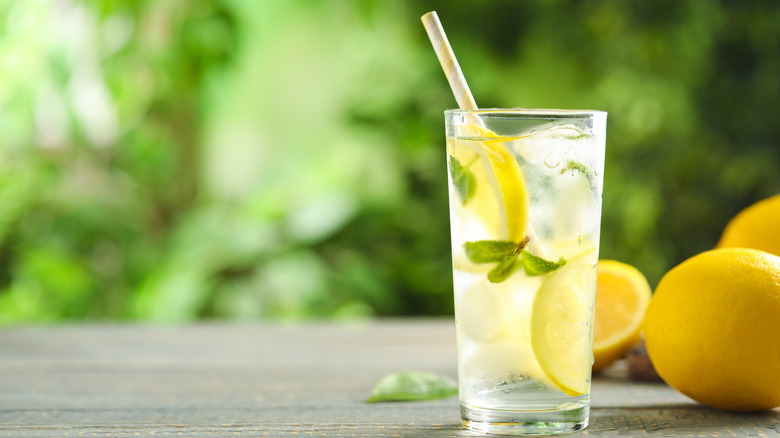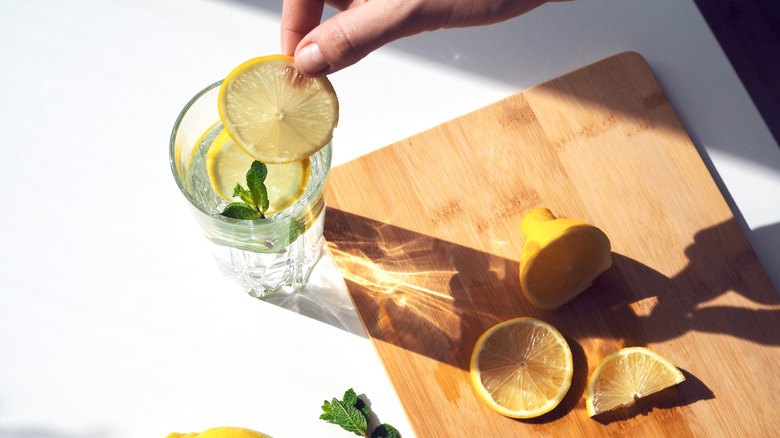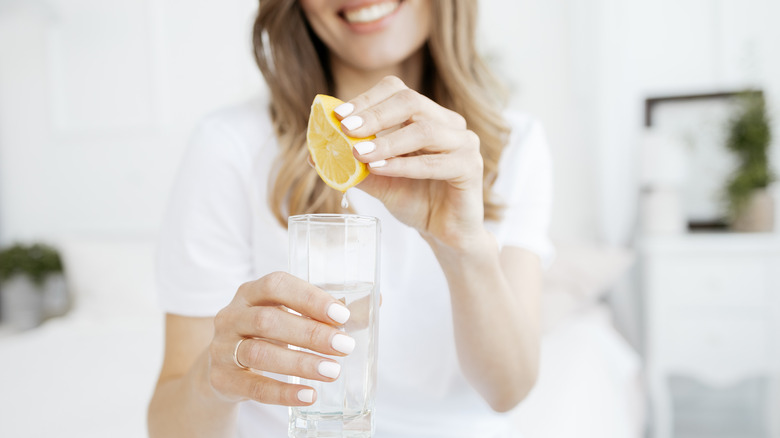What You Should Stop Believing About Drinking Lemon Water
Lemon water is a versatile and delicious beverage that is easy to incorporate into your daily routine. Whether you prefer squeezing lemon into hot water to sip before bed or you like to add it to your water bottle throughout the day, it's a quick way to add some pizzazz to good ol' H2O. In the midst of all of the purported benefits of lemon water, some are true and others aren't scientifically backed, says LiveStrong.
Squeezing lemon into your water can have several positive effects on your health. Cleveland Clinic reports that starting your day with lemon water has been proven to improve digestion, reduce the risk of kidney stones, and give you boosts of Vitamin C and potassium to power through your morning. Lemon water can also prevent oxidation since lemons possess phytonutrients that can decrease the risk of disease. Phytonutrients serve as antioxidants that fight cell damage caused by oxidation.
In fact, a 2019 study published in Scientific Reports found that long-term consumption of lemons might prolong the lifespan and produce anti-aging effects. Researchers also determined that intestinal health might be increased through lifelong intake of lemons. A good way to achieve this is by drinking lemon water.
While these benefits of including lemons in your daily diet have scientific support, there are some alleged benefits of this citrus fruit that aren't scientifically backed. Here are the myths about lemon water that you should know about.
Myths about lemon water
Although lemon water has many proven benefits, there are several unproven claims out there. According to LiveStrong, some of the myths you should stop believing about lemon water are that it can increase energy, it can treat diabetes, and it can serve as a cleanse or detox for your body. A combination of lemon, ginger, and cayenne shots is popularly sold as an alleged energy-booster, but there isn't any scientific evidence to back up the alleged benefits of this combo.
Similar ingredients are also commonly marketed as a way to detox the body, but once again there isn't any evidence to support this, notes LiveStrong. You may hear claims that lemon water and concocted beverages containing lemon can detox the liver, but this is neither possible nor necessary since the liver detoxifies itself through its normal functions. Lemon water has vitamins, like Vitamin C, that can aid in ensuring that your liver and body are getting the nutrients they need to stay in good shape, but lemon water won't detoxify nor cleanse your body the way advertisers may make you think.
As for claims about lemon water's protective properties against diabetes, debunking this myth is twofold (via LiveStrong). First, the effects of the naringenin found in lemons, which is claimed to have components that can decrease diabetic nephropathy, have never been tested on humans. Second, there is so little naringenin in lemon juice that the desired effect would be practically impossible to achieve.
Risks of consuming lemon water
Even though only some of the purported benefits of lemon water have been scientifically proven, it's still a delicious and nutritious beverage. However, there are some risks to drinking lemon water that may surprise you.
Since lemons are an acidic fruit, there's a chance that consuming lemon water may damage tooth enamel (per Well+Good). The acidity of the citrus fruit can soften tooth enamel and result in cavities, yellowing of teeth, and sensitive gums. Two ways to mitigate damage to tooth enamel are to first drink your lemon water through a straw so that the lemon comes into only partial contact with teeth, then follow up your lemon water with a glass of just water to rinse out the acidity of the lemon and refresh your mouth.
A good thing about lemon water is that it increases hydration, but the drawback is it may cause increased urination, says LiveStrong. Another risk to keep in mind is potential food poisoning. With lemons, the best way to prevent food poisoning is to make certain that you properly wash each fruit before you squeeze it into your water glass. If your preference is to keep slices of lemon in your glass, keep the beverage refrigerated so that any bacteria are kept at bay. Don't leave it out of the fridge for more than two hours.



